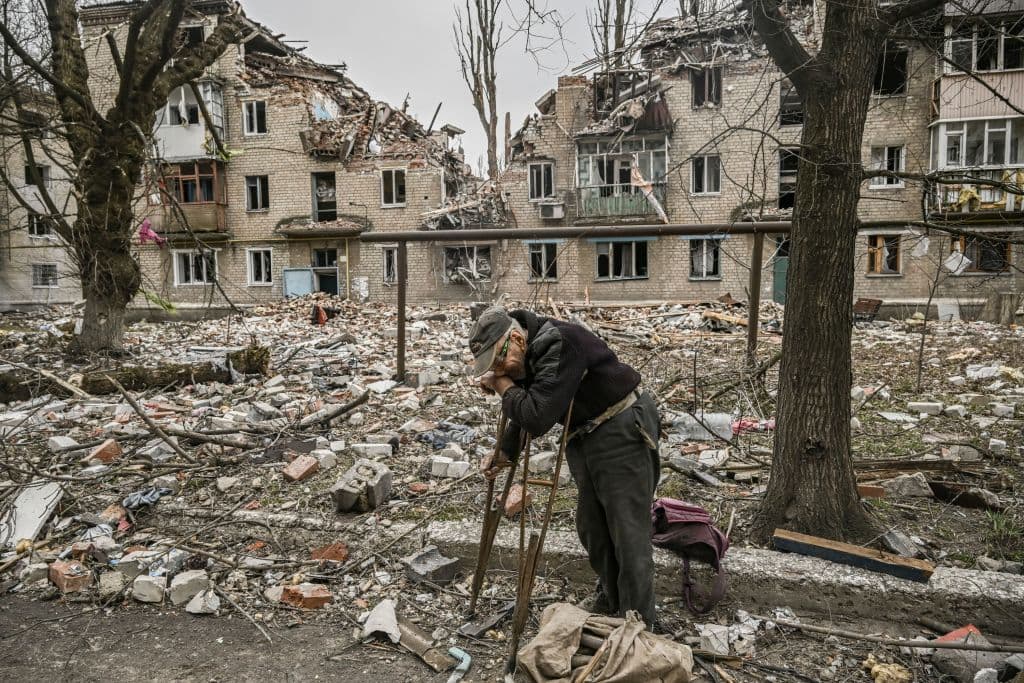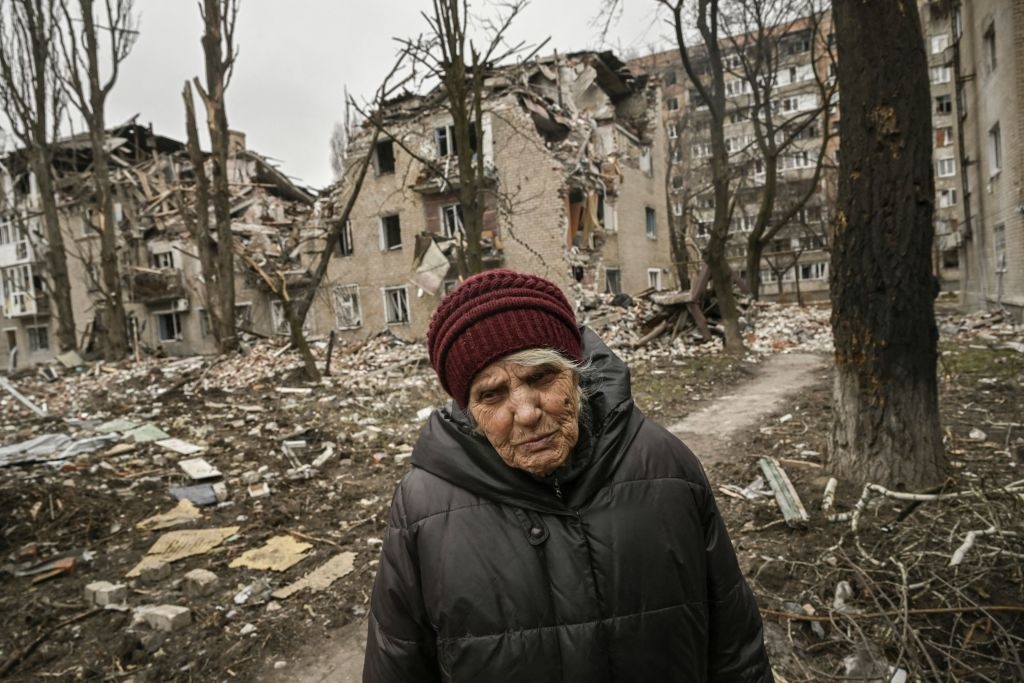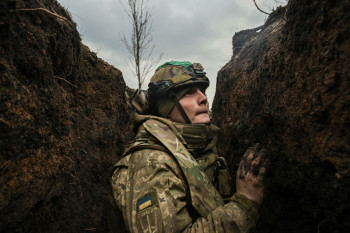Ukraine war latest: Russian media report Putin’s visits to occupied Crimea, Mariupol

Key developments on March 18-19:
- Russian state media: Putin visits occupied Crimea, Mariupol over the weekend
- Germany says it will have to arrest Putin if he enters its territory over ICC order
- Governor: At least 3 civilians killed, 18 wounded in Donetsk Oblast
- Ukrainian-Russian grain deal kicks off after third extension
Russian state media reported that Russian President Vladimir Putin had made his first known wartime trips to occupied territories in Ukraine over the weekend, visiting Crimea and Mariupol just days after a warrant for his arrest was issued by international prosecutors.
Putin reportedly visited Crimea on March 18 to mark the ninth anniversary of his country’s illegal occupation of the Ukrainian Black Sea peninsula. Russia invaded Crimea in February 2014 and staged a sham referendum over the peninsula’s status in March.
Fast forward to March 2023, Russian state-controlled media reported Putin’s appearance at the Children's Art and Aesthetic center at the Chersonesos Taurica historical and archeological park in the Crimean city of Sevastopol.
A day later, Putin reportedly visited Mariupol – a port city in Donetsk Oblast that fell to Russia in May 2022 after a brutal months-long siege. Much of the city, once home to 450,000 residents, had been destroyed by heavy Russian bombardment, and local authorities say that over 22,000 civilians may have been killed.
According to Kremlin-controlled media Ria Novosti, Putin arrived in Mariupol with a helicopter and drove around the city in a car. Afterward, Putin reportedly held a meeting at the military’s “command post” in the southern Russian city of Rostov-on-Don, the state Rossiya 24 channel reported.
The series of Putin’s weekend trips came after the International Criminal Court (ICC) on March 17 issued an arrest warrant against Putin for being “allegedly responsible for the war crime of unlawful deportation of population (children) and that of unlawful transfer of population (children) from occupied areas of Ukraine to the Russian Federation."
Ukraine hailed the ICC’s landmark decision as the beginning of a long road ahead to punish the Kremlin for war crimes.
In his evening address on March 19, President Volodymyr Zelensky said the ICC’s arrest warrant was “a turning point.”
“This week has finally brought a really significant international legal result for Ukraine (and) for justice,” Zelensky said in his video address.
While Putin is unlikely to end up behind bars soon, the ICC’s arrest warrant is seen as a historic decision that could make it more difficult for him to travel abroad and speak to world leaders.
The ICC’s arrest warrant obligates 123 countries that have adopted the Rome Statute to arrest Putin and hand him over to The Hague, but it’s up to the signatory states to enforce the order.
Both Russia and Ukraine signed the ICC’s founding Rome Statute in 2000 but never ratified the agreement and don’t come under its jurisdiction. Russia formally withdrew its signature in 2016, a day after the prosecutors issued a report that labeled Crimea’s status as an occupation.
ICC sources told the Guardian on March 17 that it was now “very unlikely” that Putin would be able to visit countries that support Ukraine. They said Putin could still fly to non-signatory China.
German Justice Minister Marco Buschmann said on March 19 that his country would have to arrest Putin if he enters its territory and if the ICC asks the states for enforcement.
Since Russia launched its full-scale invasion of Ukraine, more than 16,000 children were reported to have been forcibly deported from Ukraine, according to the National Information Bureau's March data.
Michael Carpenter, the U.S. Ambassador to the OSCE, said on Jan. 13 that Russia reportedly abducted as many as 2,000 children from Ukraine into Russia in just the first weeks of 2023.
Intensifying attacks in the east
Russian forces intensified their attacks on civilian areas in Donetsk Oblast over the weekend, further threatening the remaining residents in and near the embattled city of Bakhmut.
Donetsk Oblast Governor Pavlo Kyrylenko said on March 19 that at least three civilians were killed and 18 were wounded over the past day. He also reported Russian cluster munition attacks on Kramatorsk and Kostiantynivka on March 18.
On the Bakhmut front, the Ukrainian military reported heavy fighting rages around the city.
Serhiy Cherevatyi, a spokesperson for Ukraine's Eastern Military Command, said on March 19 that Russian forces were carrying out several dozen attacks a day and claimed that they were suffering heavy losses.
The Institute for the Study of War (ISW) said in its March 18 report that Russian forces continued their offensive operations in and around Bakhmut.
The ISW said that the Ukrainian military’s report of repelling Russian attacks in the northern part of Bakhmut could indicate that the Russians are focusing on their push there.

Renewed Ukrainian-Russian grain deal
The grain deal, which enables Ukraine to export millions of tonnes of food commodities via the Black Sea, resumed on March 19 after Kyiv and Moscow agreed to renew it for the third time on the deadline.
Dumskaya, an Odesa-based news site, reported on March 19, citing a real-time Marine Traffic website, that a convoy of six dry cargo ships arrived at the Odesa port in the morning to be loaded with Ukrainian agro-industrial products.
The UN and Turkey-brokered landmark accord, signed in July 2022, has been paramount to subduing soaring food prices worldwide. Ukraine is a major exporter of wheat, sunflower oil, and other food products. According to the UN, food prices fell by 17.9% in February 2023 from an all-time high in March 2022.
While the grain deal was extended on March 18, there remains a dispute on its timeframe.
Ukraine’s Infrastructure Minister Oleksandr Kubrakov announced that it was renewed for another 120 days, while the Russian Foreign Ministry said it only agreed to a 60-day period.
The UN and Turkey confirmed that the grain deal was extended but did not mention for how long. They have both backed Ukraine's call for a full 120-day rollover period over the past week amid Russia's push to renew the pact for only 60 days.
The grain deal – which remained one of the few cases of cooperation between Ukraine and Russia and opened up three designated Black Sea ports in the southern Odesa Oblast – has allowed Ukraine to export some 25 million metric tons of food commodities to 45 countries, according to the UN.











